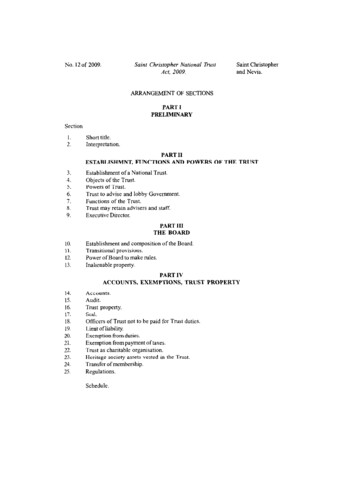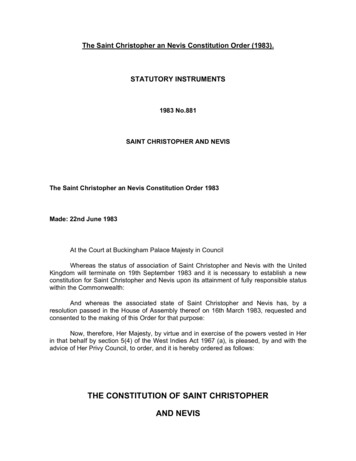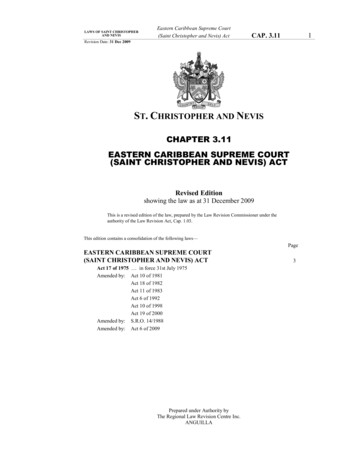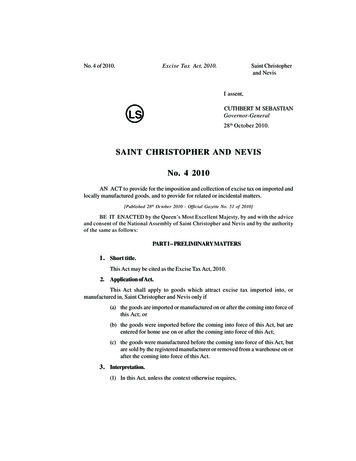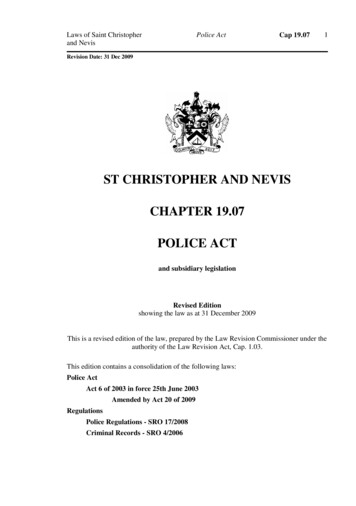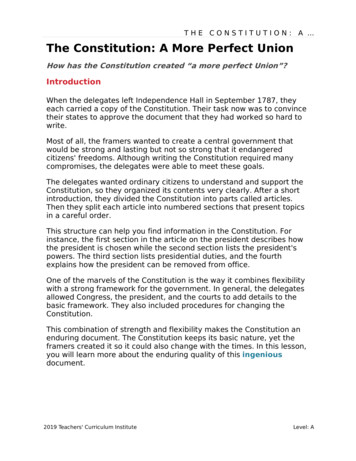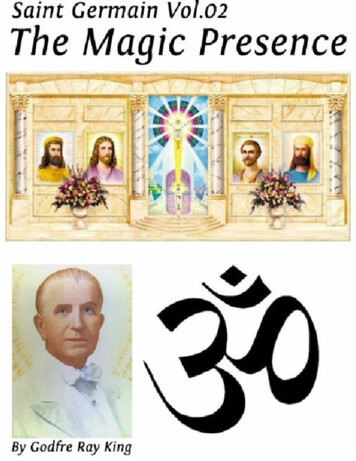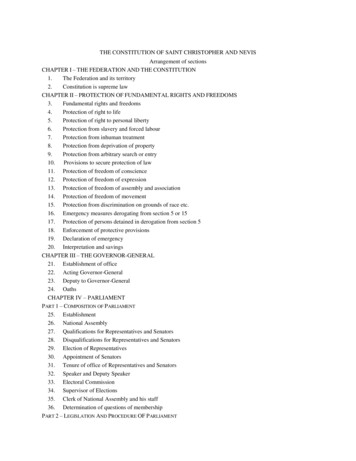
Transcription
THE CONSTITUTION OF SAINT CHRISTOPHER AND NEVISArrangement of sectionsCHAPTER I – THE FEDERATION AND THE CONSTITUTION1.The Federation and its territory2.Constitution is supreme lawCHAPTER II – PROTECTION OF FUNDAMENTAL RIGHTS AND FREEDOMS3.Fundamental rights and freedoms4.Protection of right to life5.Protection of right to personal liberty6.Protection from slavery and forced labour7.Protection from inhuman treatment8.Protection from deprivation of property9.Protection from arbitrary search or entry10.Provisions to secure protection of law11. Protection of freedom of conscience12. Protection of freedom of expression13. Protection of freedom of assembly and association14. Protection of freedom of movement15. Protection from discrimination on grounds of race etc.16. Emergency measures derogating from section 5 or 1517. Protection of persons detained in derogation from section 518. Enforcement of protective provisions19. Declaration of emergency20. Interpretation and savingsCHAPTER III – THE GOVERNOR-GENERAL21. Establishment of office22. Acting Governor-General23. Deputy to Governor-General24. OathsCHAPTER IV – PARLIAMENTPART 1 – COMPOSITION OF PARLIAMENT25. Establishment26. National Assembly27. Qualifications for Representatives and Senators28. Disqualifications for Representatives and Senators29. Election of Representatives30. Appointment of Senators31. Tenure of office of Representatives and Senators32. Speaker and Deputy Speaker33. Electoral Commission34. Supervisor of Elections35. Clerk of National Assembly and his staff36. Determination of questions of membershipPART 2 – LEGISLATION AND PROCEDURE OF PARLIAMENT
37.38.39.40.41.42.43.44.45.Power to make lawsAlteration of Constitution and Supreme Court OrderOathPresidingVotingMode of exercise of legislative powerRestrictions with regard to certain financial measuresRegulation of procedure in National AssemblyFreedom of speechPART 3 – SUMMONING, PROROGATION AND DISSOLUTION46. Sessions47. Prorogation and dissolution48. Holding of electionsPART 4 – DELIMITATION OF CONSTITUENCIES49. Constituency Boundaries Commission50. Review of constituency boundariesCHAPTER V – THE EXECUTIVE51. Executive authority52. Ministers53. Cabinet54. Allocation of portfolios55. Absence or illness of Prime Minister56. Exercise of Governor-General’s functions57. Governor-General to be kept informed58. Leader of the Opposition59. Parliamentary Secretaries60. Oaths61. Permanent Secretaries62. Secretary to Cabinet63. Constitution of offices etc.64. Attorney-General65. Control of public prosecutions66. Prerogative of mercy67. Committee on Prerogative of Mercy68. Functions of CommitteeCHAPTER VI – FINANCE69. Consolidated Fund70. Withdrawals from Consolidated Fund or other public funds71. Authorisation of expenditure from Consolidated Fund by the appropriation law72. Authorisation of expenditure in advance of appropriation73. Warrants for unforeseen expenditure74. Remuneration of certain officers75Public debt76. Audit of public accounts etc.CHAPTER VII – THE PUBLIC SERVICE
PART 1 – THE PUBLIC SERVICE COMMISSION77. Public Service Commission78. Appointment etc. of public officersPART 2 – APPOINTMENT ETC. TO PARTICULAR OFFICES79. Appointment etc. of permanent secretaries and certain other officers80. Attorney-General when a public officer81. Director of Public Prosecutions82. Director of Audit83. Appointment etc. of magistrates, registrars and legal officersPART 3 – THE POLICE84. Police Service Commission85. Appointment etc. of police officersPART 4 – THE PUBLIC SERVICE BOARD OF APPEAL86. Public Service Board of Appeal87. Appeals to Public Service Board of AppealPART 5 – PENSIONS88. Pensions laws and protection of pensions rights89. Power to withhold pensions etc.CHAPTER VIII – CITIZENSHIP90. Persons who become citizens at independence91. Persons who become citizens after independence92. Registration93. Dual citizenship94. Acquisition, renunciation, certification and deprivation95. InterpretationCHAPTER IX – JUDICIAL PROVISIONS96. Original jurisdiction of High Court in constitutional questions97. Reference of constitutional questions to High Court98. Appeals to Court of Appeal99. Appeals to Her Majesty in CouncilCHAPTER X – THE ISLAND OF NEVIS100. Nevis Island Legislature101. Nevis Island Assembly102. Nevis Island Administration103. Power to make laws104. Provisions applied with modifications105. Exercise of Governor-General’s functions106. Responsibilities of Administration107. Public safety and public order108. Finance109. Staff110. Revenue allocation111. Grants and loans112. Disputes between Administration and Government113. Separation of Nevis from Saint Christopher
114. InterpretationCHAPTER XI – MISCELLANEOUS115. Secession of Nevis116. Functions of Governor-General117. Resignations118. Re-appointment and concurrent appointments119. Interpretation120. Text of modified provisionsSCHEDULE 1PROVISIONS REFERRED TO IN SECTION 38(3)SCHEDULE 2RULES FOR DELIMITATION OF CONSTITUENCIESSCHEDULE 3ALTERATIONS IF NEVIS SECEDESSCHEDULE 4FORMS OF OATHSCHEDULE 5LEGISLATIVE POWERSSCHEDULE 6TEXT OF PROVISIONS APPLIED WITH MODIFICATIONSTHE CONSTITUTION OF SAINT CHRISTOPHER AND NEVISWHEREAS the People of Saint Christopher and Nevis(a)declare that the nation is established on the belief in Almighty God and the inherent dignity ofeach individual;(b)assert that they are entitled to the protection of fundamental rights and freedoms;(c)believe in the concept of true democracy with free and fair elections;(d)desire the creation of a climate of economic wellbeing in the context of respect for law andorder; and(e)are committed to achieve their national objectives with a unity of purpose:NOW, THEREFORE, the following provisions shall have effect as the Constitution of Saint Christopher andNevis:CHAPTER I – THE FEDERATION AND THE CONSTITUTION1.The Federation and its territory.(1)The island of Saint Christopher (which is otherwise known as Saint Kitts) and the island of Nevisshall be a sovereign democratic federal state which may be styled Saint Christopher and Nevis or Saint Kitts andNevis or the Federation of Saint Christopher and Nevis or the Federation of Saint Kitts and Nevis.(2)The territory of Saint Christopher and Nevis shall comprise all areas that were comprised in theassociated state of Saint Christopher and Nevis immediately before 19th September 1983, together with such otherareas as may be declared by Parliament to form part of the territory of Saint Christopher and Nevis.2.Constitution is supreme law.This Constitution is the supreme law of Saint Christopher and Nevis and, subject to the provisions of thisConstitution, if any other law is inconsistent with this Constitution, this Constitution shall prevail and the other lawshall, to the extent of the inconsistency, be void.
CHAPTER II – PROTECTION OF FUNDAMENTAL RIGHTS AND FREEDOMS3.Fundamental rights and freedoms.Whereas every person in Saint Christopher and Nevis is entitled to the fundamental rights and freedoms, thatis to say, the right, whatever his or her race, place of origin, birth, political opinions, colour, creed or sex, but subjectto respect for the rights and freedoms of others and for the public interest, to each and all of the following, namely,(a)life, liberty, security of the person, equality before the law and the protection of the law;(b)freedom of conscience, of expression and of assembly and association; and(c)protection for his or her personal privacy, the privacy of his or her home and other property andfrom deprivation of property without compensation,the provisions of this Chapter shall have effect for the purpose of affording protection to those rights and freedomssubject to such limitations of that protection as are contained in those provisions, being limitations designed toensure that the enjoyment of those rights and freedoms by any person does not impair the rights and freedoms ofothers or the public interest.4.Protection of right to life.(1)A person shall not be deprived of his or her life intentionally save in execution of the sentence of acourt in respect of a criminal offence of treason or murder under any law of which he or she has been convicted.(2)A person shall not be regarded as having been deprived of his or her life in contravention ofsubsection (1) if he or she dies as the result of the use, to such extent and in such circumstances as are permitted bylaw, of such force as is reasonably justifiable(a)for the defence of any person from violence or for the defence of property;(b)in order to effect a lawful arrest, or to prevent the escape, of a person lawfully detained;(c)for the purpose of suppressing a riot, insurrection or mutiny; or(d)in order to prevent the commission by that person of a criminal offence,or if he or she dies as the result of a lawful act of war.5.Protection of right to personal liberty.(1)A person shall not be deprived of his or her personal liberty save as may be authorised by law in anyof the following cases, that is to say,(a)in consequence of his or her unfitness to plead to a criminal charge;(b)in execution of the sentence or order of a court, whether established for Saint Christopher andNevis or some other country, in respect of a criminal offence of which he or she has beenconvicted;(c)in execution of the order of the High Court or the Court of Appeal punishing him or her forcontempt of that court or of another court or tribunal;(d)in execution of the order of a court made to secure the fulfilment of any obligation imposed onhim or her by law;(e)for the purpose of bringing him or her before a court in execution of the order of a court;(f)upon reasonable suspicion of his or her having committed, or being about to commit, acriminal offence under any law;(g)under the order of a court or with the consent of his or her parent or guardian, for his or hereducation or welfare during any period ending not later than the date when he or she attains theage of eighteen years;(h)for the purpose of preventing the spread of an infectious or contagious disease;
(i)in the case of a person who is, or is reasonably suspected to be, of unsound mind, addicted todrugs or alcohol, or a vagrant, for the purpose of his or her care or treatment or the protectionof the community;(j)for the purpose of preventing the unlawful entry of that person into Saint Christopher andNevis or for the purpose of effecting the expulsion, extradition or other lawful removal of thatperson from Saint Christopher and Nevis or for the purpose of restricting that person while heor she is being conveyed through Saint Christopher and Nevis in the course of his or herextradition or removal as a convicted prisoner from one country to another; or(k)to such extent as may be necessary in the execution of a lawful order requiring that person toremain within a specified area within Saint Christopher and Nevis, or prohibiting him or herfrom being within such an area, or to such extent as may be reasonably justifiable for the takingof proceedings against that person with a view to the making of any such order or relating tosuch an order after it has been made, or to such extent as may be reasonably justifiable forrestraining that person during any visit that he or she is permitted to make to any part of SaintChristopher and Nevis in which, in consequence of any such order, his or her presence wouldotherwise be unlawful.(2)Any person who is arrested or detained shall with reasonable promptitude and in any case not laterthan forty-eight hours after such arrest or detention be informed in a language that he or she understands of thereasons for his or her arrest or detention and be afforded reasonable facilities for private communication andconsultation with a legal practitioner of his or her own choice and, in the case of a person under the age of eighteenyears, with his or her parents or guardian.(3)Any person who is arrested or detained(a)for the purpose of bringing him or her before a court in execution of the order of a court; or(b)upon reasonable suspicion of his or her having committed, or being about to commit, acriminal offence under any lawand who is not released, shall be brought before a court without undue delay and in any case not later than seventytwo hours after his or her arrest or detention.(4)Where any person is brought before a court in execution of the order of a court in any proceedings orupon suspicion of his or her having committed or being about to commit a criminal offence, he or she shall not bethereafter further held in custody in connection with those proceedings or that offence save upon the order of acourt.(5)If any person arrested or detained as mentioned in subsection (3)(b) is not tried within a reasonabletime, then, without prejudice to any further proceedings that may be brought against him or her , he or she shall bereleased either unconditionally or upon reasonable conditions, including in particular such conditions as arereasonably necessary to ensure that he or she appears at a later date for trial or for proceedings preliminary to trial,and such conditions may include bail so long as it is not excessive.(6)Any person who is unlawfully arrested or detained by any other person shall be entitled tocompensation therefor from that other person or from any other person or authority on whose behalf that otherperson was acting:Provided that a judge, a magistrate or a justice of the peace or an officer of a court or a police officer actingin pursuance of the order of a judge, a magistrate or a justice of the peace shall not be under any personal liability topay compensation under this subsection in consequence of an act performed by him or her in good faith in thedischarge of the functions of his or her office and any liability to pay any such compensation in consequence of anysuch act shall be a liability of the Crown.(7)For the purposes of subsection (1)(b) a person charged before a court with a criminal offence inrespect of whom a special verdict has been returned that he or she was guilty of the act or omission charged but wasinsane when he or she did the act or made the omission or that he or she is not guilty by reason of insanity shall beregarded as a person who has been convicted of a criminal offence and the detention of that person in consequenceof such a verdict shall be regarded as detention in execution of the order of a court.
6.7.Protection from slavery and forced labour.(1)A person shall not be held in slavery or servitude.(2)No person shall be required to perform forced labour.(3)For the purposes of this section, the expression “forced labour” does not include(a)any labour required in consequence of the sentence or order of a court;(b)labour required of any person while he or she is lawfully detained that, though not required inconsequence of the sentence or order of a court, is reasonably necessary in the interests ofhygiene or for the maintenance of the place at which he or she is detained;(c)any labour required of a member of a disciplined force in pursuance of his or her duties as suchor, in the case of a person who has conscientious objections to service as a member of adefence force, any labour that that person is required by law to perform in place of suchservice; or(d)any labour required during any period of public emergency or in the event of any accident ornatural calamity that threatens the life and well-being of the community, to the extent that therequiring of such labour is reasonably justifiable in the circumstances of any situation arisingor existing during that period or as a result of that accident or natural calamity, for the purposeof dealing with that situation.Protection from inhuman treatment.A person shall not be subjected to torture or to inhuman degrading punishment or other like treatment.8.Protection from deprivation of property.(1)No property of any description shall be compulsorily taken possession of, and no interest in or rightover property of any description shall be compulsory acquired, except for a public purpose and by or under theprovisions of a law that prescribes the principles on which and the manner in which compensation therefor is to bedetermined and given.(2)Every person having an interest in or right over property that is compulsorily taken possession of orwhose interest in or right over any property is compulsorily acquired shall have a right of direct access to the HighCourt for—(a)the determination of his or her interest or right, the legality of the taking of possession oracquisition of the property, interest or right and the amount of any compensation to which he orshe is entitled; and(b)the purpose of enforcing his or her right to prompt payment of that compensation:Provided that, if the legislature so provides in relation to any matter referred to in paragraph (a), the right ofaccess shall be by way of appeal (exercisable as of right at the instance of the person having the interest in or rightover the property) from a tribunal or authority, other than the High Court, having jurisdiction under any law todetermine that matter.(3)The Chief Justice may make rules with respect to the practice and procedure of the High Court or,subject to such provision as may have been made in that behalf by the legislature, with respect to the practice andprocedure of any other tribunal or authority in relation to the jurisdiction conferred on the High Court by subsection(2) or exercisable by the other tribunal or authority for the purposes of that subsection (including rules with respectto the time within which applications or appeals to the High Court or applications to the other tribunal or authoritymay be brought).(4)A person who is entitled to compensation by virtue of subsection (1) shall not be prevented fromremitting, within a reasonable time after he or she has received any amount of that compensation in the form of asum of money or, as the case may be, has received any such amount in some other form and has converted any ofthat amount into a sum of money, the whole of that sum of money (subject to any tax that applies generally topersons remitting moneys but free from any other deduction, charge or tax made or levied in respect of itsremission) to any country of his or her choice outside Saint Christopher and Nevis.
(5)Nothing contained in or done under the authority of any law shall be held to be inconsistent with or incontravention of subsection (4) to the extent that the law in question authorises(a)the attachment, by order of a court, of any amount of compensation to which a person isentitled in satisfaction of the judgment of a court or pending the determination of civilproceedings to which he or she is a party;(b)the imposition of reasonable restrictions on the manner in which any sum of money is to beremitted; or(c)the imposition of reasonable restrictions upon the remission of any sum of money in order toprevent or regulate the transfer to a country outside Saint Christopher and Nevis of capitalraised in Saint Christopher and Nevis or in some other country or derived from the naturalresources of Saint Christopher and Nevis.(6)Nothing contained in or done under the authority of any law shall be held to be inconsistent with or incontravention of subsection (1)(a)to the extent that the law in question makes provision for the taking of possession of oracquisition of any property, interest or right(i) in satisfaction of any tax, rate or due;(ii) by way of penalty for breach of any law or forfeiture in consequence of breach of anylaw;(b)(iii) as an incident of a lease, tenancy, mortgage, charge, bill of sale, pledge or contract;(iv) in the execution of judgments or orders of a court in proceedings for the determination ofcivil rights or obligations;(v) in circumstances where it is reasonably necessary so to do because the property is in adangerous state or likely to be injurious to the health of human beings, animals or plants;(vi) in consequence of any law with respect to the limitation of actions; or(vii) for so long only as may be necessary for those purposes, for the purposes of anyexamination, investigation, trial or inquiry or, in the case of land, for the purposes of thecarrying out thereon of work of soil conservation or the conservation of other naturalresources or work relating to agricultural development or improvement (being workrelating to such development or improvement that the owner or occupier of the land hasbeen required, and has without reasonable excuse refused or failed, to carry out),and except so far as that provision or, as the case may be, the thing done under the authoritythereof is shown not to be reasonably justifiable in a democratic society; orto the extent that the law in question makes provision for the taking of possession of oracquisition of any of the following property (including an interest in or right over property),that is to say,(i) enemy property;(ii) property of a deceased person, a person of unsound mind or a person who has not attainedthe age of eighteen years, for the purpose of its administration for the benefit of thepersons entitled to the beneficial interest therein;(iii) property of a person adjudged bankrupt or a body corporate in liquidation, for the purposeof its administration for the benefit of the creditors of the bankrupt or body corporate and,subject thereto, for the benefit of other persons entitled to the beneficial interest in theproperty; or(iv) property subject to a trust, for the purpose of vesting the property in persons appointed astrustees under the instrument creating the trust or by a court or, by order of a court, forthe purpose of giving effect to the trust.(7)Nothing contained in or done under the authority of any law enacted by Parliament shall be held to beinconsistent with or in contravention of this section to the extent that the law in question makes provision for thecompulsory acquisition of any interest in or right over property, where that property, interest or right is held by a
body corporate established by law for public purposes in which no moneys have been invested other than moneysprovided by Parliament.(8)Nothing contained in or done under the authority of any law enacted by the Nevis Island Legislatureshall be held to be inconsistent with or in contravention of this section to the extent that the law in question makesprovision for the compulsory taking of possession of any property, or the compulsory acquisition of any interest inor right over property, where that property, interest or right is held by a body corporate established by law for publicpurposes in which no moneys have been invested other than moneys provided by that Legislature.9.Protection from arbitrary search or entry.(1)Except with his or her own consent, a person shall not be subject to the search of his or her person orhis or her property or the entry by others on his or her premises.(2)Nothing contained in or done under the authority of any law shall be held to be inconsistent with or incontravention of this section to the extent that the law in question makes provision(a)that is reasonably required in the interests of defence, public safety, public order, publicmorality, public health, town and country planning, the development and utilisation of mineralresources or the development or utilisation of any property for a purpose beneficial to thecommunity;(b)that is reasonably required for the purpose of protecting the rights or freedoms of other persons;(c)that authorises an officer or agent of the Government, the Nevis Island Administration, a localgovernment authority or a body corporate established by law for public purposes to enter on thepremises of any person in order to inspect those premises or anything thereon for the purposeof any tax, rate or due or in order to carry out work connected with any property that islawfully on those premises and that belongs to that Government, Administration, authority orbody corporate, as the case may be; or(d)that authorises, for the purpose of enforcing the judgment or order of a court in any civilproceedings, the search of any person or property by order of a court or entry upon anypremises by such an order,and except so far as that provision or, as the case may be, anything done under the authority thereof is shown not tobe reasonably justifiable in a democratic society.10.Provisions to secure protection of law.(1)If any person is charged with a criminal offence, then, unless the charge is withdrawn, the case shallbe afforded a fair hearing within a reasonable time by an independent and impartial court established by law.(2)Every person who is charged with a criminal offence(a)shall be presumed to be innocent until he or she is proved or has pleaded guilty;(b)shall be informed as soon as reasonably practicable, in a language that he or she understandsand in detail, of the nature of the offence charged;(c)shall be given adequate time and facilities for the preparation of his or her defence;(d)shall be permitted to defend himself or herself before the court in person or, at his or her ownexpense, by a legal practitioner of his or her own choice;(e)shall be afforded facilities to examine in person or by his or her legal representative thewitnesses called by the prosecution before the court, and to obtain the attendance and carry outthe examination of witnesses to testify on his or her behalf before the court on the sameconditions as those applying to witnesses called by the prosecution; and(f)shall be permitted to have without payment the assistance of an interpreter if he or she cannotunderstand the language used at the trial,and except with his or her own consent the trial shall not take place in his or her absence unless he or she soconducts himself or herself as to render the continuance of the proceedings in his or her presence impracticable andthe court has ordered him or her to be removed and the trial to proceed in his or her absence:
Provided that the trial may take place in his or her absence in any case in which it is so provided by a lawunder which he or she is entitled to adequate notice of the charge and the date, time and place of the trial and to areasonable opportunity of appearing before the court.(3)When a person is tried for any criminal offence, the accused person or any person authorised by himor her in that behalf shall, if he or she so requires and subject to payment of such reasonable fee as may beprescribed by law, be given within a reasonable time after judgment a copy for the use of the accused person of anyrecord of the proceedings made by or on behalf of the court.(4)A person shall not be held to be guilty of a criminal offence on account of any act or omission that didnot, at the time it took place, constitute such an offence, and no penalty shall be imposed for any criminal offencethat is severer in degree or description than the maximum penalty that might have been imposed for that offence atthe time when it was committed.(5)A person who shows that he or she has been tried by a competent court for a criminal offence andeither convicted or acquitted shall not again be tried for that offence or for any other criminal offence of which he orshe could have been convicted at the trial for that offence, save upon the order of a superior court in the course ofappeal or review proceedings relating to the conviction or acquittal.(6)offence.(7)A person shall not be tried for a criminal offence if he or she shows that he has been pardoned for thatA person who is tried for a criminal offence shall not be compelled to give evidence at the trial.(8)Any court or other authority prescribed by law for the determination of the existence or extent of anycivil right or obligation shall be established by law and shall be independent and impartial; and where proceedingsfor such a determination are instituted by any person before such a court or other authority, the case shall be given afair hearing within a reasonable time.(9)Where the existence or extent of any civil right or obligation has been determined in proceedings inany court or before any other authority any party to those proceedings shall, if he or she so requires and subject topayment of such reasonable fee as may be prescribed by law, be entitled to obtain within a reasonable time after thejudgment or other determination a copy of any record of the proceedings made by or on behalf of the court or otherauthority.(10) Except with the agreement of all the parties thereto, all proceedings of every court and all proceedingsfor the determination of the existence or extent of any civil right or obligation before any other authority, includingthe announcement of the decision of the court or other authority, shall be held in public.(11) Nothing in subsection (10) shall prevent the court or other adjudicating authority from excluding fromthe proceedings persons other than the parties thereto and the legal practitioners representing them to such extent asthe court or other authority(a)may by law be empowered to do and may consider necessary or expedient in circumstanceswhere publicity would impair the interests of justice or in interlocutory proceedings or in theinterests of public morality, the welfare of persons under the age of eighteen years or theprotection of the private lives of persons concerned in the proceedings; or(b)may by law be empowered or required to do in the interests of defence, public safety or publicorder.(12) Nothing contained in or done under the authority of any law shall be held to be inconsistent with or incontravention of(a)subsection (2)(a) to the extent that the law in question imposes upon any person charged with acriminal offence the burden of proving particular facts;(b)subsection (2)(e) to the extent that the law in question imposes reasonable conditions that mustbe satisfied if witnesses called to testify on behalf of an accused person ar
(2) The territory of Saint Christopher and Nevis shall comprise all areas that were comprised in the associated state of Saint Christopher and Nevis immediately before 19th September 1983, together with such other areas as may be declared by Parliament to form part of the territory of Saint Christopher and Nevis. 2.


